Welcome to our second installment on our 2022 Birth Justice Year in Review. In my first post, I introduced the Healthy Youth Development Strategic Partnership team and our commitment to Birth Justice. I also discussed the importance of community-based doulas and other perinatal birth workers in closing equity gaps for birthing families.
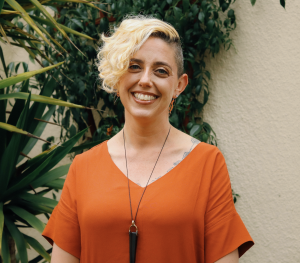
In this second entry, we share a co-authored blog, written with Alli Cuentos of SisterWeb and Zainab “Zee” Sulaiman of HealthConnect One, where we tell the story of the emerging Doula Data + Compensation project.

Part II: A Re-birth for Birth Workers
Across the United States, healthcare systems repeatedly and consistently fail Black, Indigenous, and birthing people of color and their infants. In San Francisco, half of people to die in recent years from pregnancy or childbirth were Black. Throughout the state of California, Black infants die at a rate 2 to 4 times higher compared to other infants and have a 1.7 times higher risk of preterm birth than their white counterparts. Against this dire – and worsening – backdrop, research repeatedly shows that doulas cultivate positive birth experiences and outcomes for birthing families as they build trusting relationships and provide “physical, emotional, and informational support” during pregnancy, birth, and postpartum.
HealthConnect One trains, mobilizes, and connects perinatal support workers, especially community-based doulas, to support Black, Brown, and Indigenous birthing families and communities from pregnancy through the first two years of a child’s life: the first 1,000 days. They are also a leading national advocate for fair pay for birth workers and reproductive justice, and they support research to generate a strong, community-rooted knowledge base to inform systems’ change.
SisterWeb, a network of culturally congruent community doulas from and for Black, Native Hawaiian and Pacific Islander, and Latine/Latinx communities, serves families in San Francisco since 2019. SisterWeb doulas provide their services at no cost to their clients, and they are respected partners of local hospitals and health agencies, who refer families to their organization for support in their full-spectrum perinatal journeys. SisterWeb also organizes to advocate for and advance economic justice for community-based doulas.
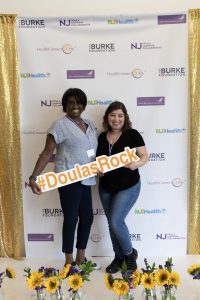 Both organizations know that the standard model of the doula profession is unsustainable for community health workers, including across California, where the failure of policymakers to adequately support community-based doulas’ work limits their reach.
Both organizations know that the standard model of the doula profession is unsustainable for community health workers, including across California, where the failure of policymakers to adequately support community-based doulas’ work limits their reach.
When Doulas Were Left Out of Health Equity Decisions…
In the summer of 2021, a coalition of community-based doula organizers gathered while the California Assembly debated and prepared to pass a “Momnibus” Law. This sweeping legislation aims to combat maternal mortality and morbidity in the state, including extending Medi-Cal (the state’s version of Medicaid) reimbursement for doulas who work with low-income clients. Back-and-forth between the Governor’s office, researchers, and organizers delayed this benefit’s implementation twice. Finally, starting in January 2023, this “doula benefit” went into effect.
This new benefit is an initial policy win for community-based doulas and birthing families who are not served by the current – primarily private-pay – system of perinatal care, but it has its drawbacks. California’s program will compensate doulas on a per-birth basis, even though many community-based doulas provide full-spectrum care beyond assisting with births. The policy also imposes a cap on the amount that can be billed per client regardless of the circumstances that inform the care their doula provides them. Research already shows that these policy choices create conditions for insufficient doula compensation and reduce the number of doulas willing to work with Medicare-enrolled families.
While policymakers in California and across the country debate and enact reimbursement laws, few people have taken the time to actually ask community-based doulas what kind of reimbursement would be right for them. Many researchers fail to take the time to understand doula’s working hours and the range of activities that fall under community-based “doula work.” The scant research that does exist is not wholly reliable; these findings are based on imprecise estimates or anecdotal information, use data that was not collected with the intention of using it to determine compensation, or are difficult to compare and apply across contexts. But accurate doula data and compensation data is critical information needed for them to be justly compensated!
The growing national coalition of community-based doula organizers – including folks from Ancient Song Doula Services, Birth Matters, Accompany Doula Care, Tulsa Birth Equity Initiative, Pettaway Pursuit Foundation, the Oakland Better Birth Foundation, SHARE Berkeley, SisterWeb, and HealthConnect One – critiqued the limitations of these doula reimbursement programs and proposals across public policy. (It is important to note that these problems are repeated in the social sector when philanthropic funders underpay community-based doula work because they are also missing key information to compensate birth workers justly.)
To make good policies, decision makers need good data, and their work needs to be responsive and accountable to the people meant to benefit: community-based doulas and the birthing families they can – and can’t – serve. Starting with this understanding, organizers engaged in trust building, collaborative leadership building, and project visioning to create the Doula Data + Compensation Project, now co-driven by SisterWeb and HealthConnect One.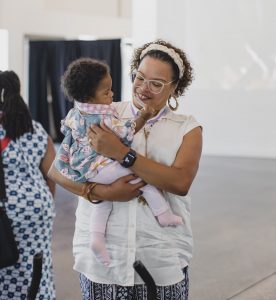
…Organizers Created a Doula Data Project…
The Doula Data + Compensation Project builds upon community-based doula time use research conducted in San Francisco that will be published in the Journal of Women’s Health. Together over the coming months, HealthConnect One and SisterWeb will co-facilitate a national project in collaboration with partner community-based doula organizations to continue collecting data on doula time use and take it one step further: they will use their findings to create lived-expert-informed recommendations to guide legislators, private insurance, and funders’ policies surrounding community-based doula reimbursement, billing, and workforce development.
This project will run in two phases. Phase I focuses on interest holder-led data collection, made possible through a convening of community-based birth workers from across the country.
SisterWeb and HealthConnect One continue to connect with doula organizations who want to be part of and contribute to a growing networks of doula collectives across the country. In February 2023, they will host the project’s first formal convening and workshop for Black, Brown, and Indigenous community-based doulas. Here, organizers will engage in a collaborative process to gather and evaluate programs’ existing data collection methods and data, specifically focusing on doula time use data and compensation structures. They will use this information to create a national data set on doula time use and community-based doula outcomes and indicators. Together, those convened will also decide on a shared data collection agenda with common measurements and methods for tracking them, and they will decide how to scale their data collection objectives in diverse community-based doula programs across the country.
To finish Phase I, HealthConnect One and SisterWeb will publish a blueprint on the doula convening’s initial data collect to continue to influence ongoing Medicaid reimbursement discussions. 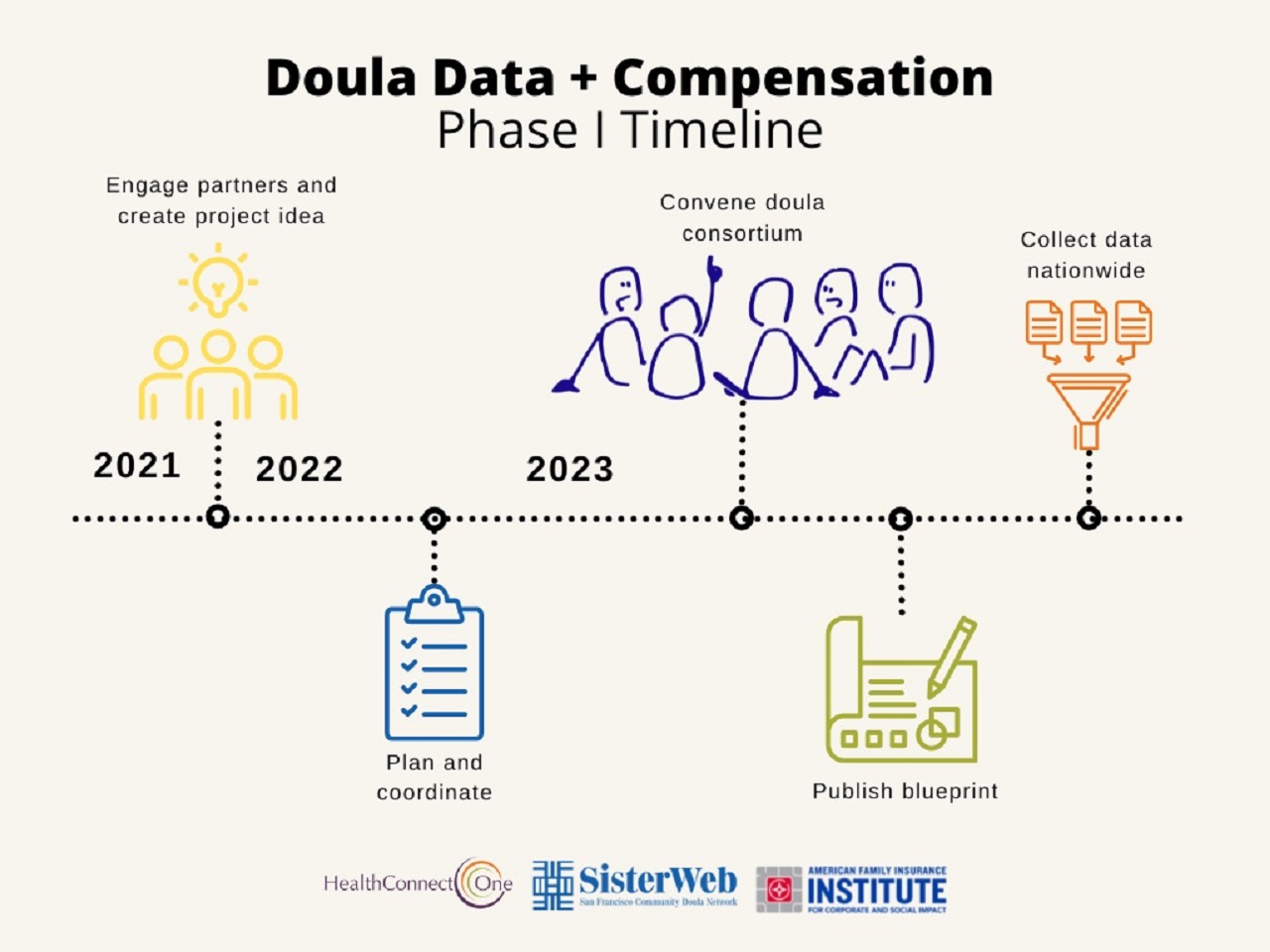 Meanwhile, after the convening, the doula consortium will return to their communities and implement a larger time use study, collecting data as they go.
Meanwhile, after the convening, the doula consortium will return to their communities and implement a larger time use study, collecting data as they go.
In Phase II of this project, these community-based doulas from all over the country will combine the information they have collected to create a first-of-its-kind national doula time use and compensation dataset. A partner organization will analyze this data into a report, and they will lay 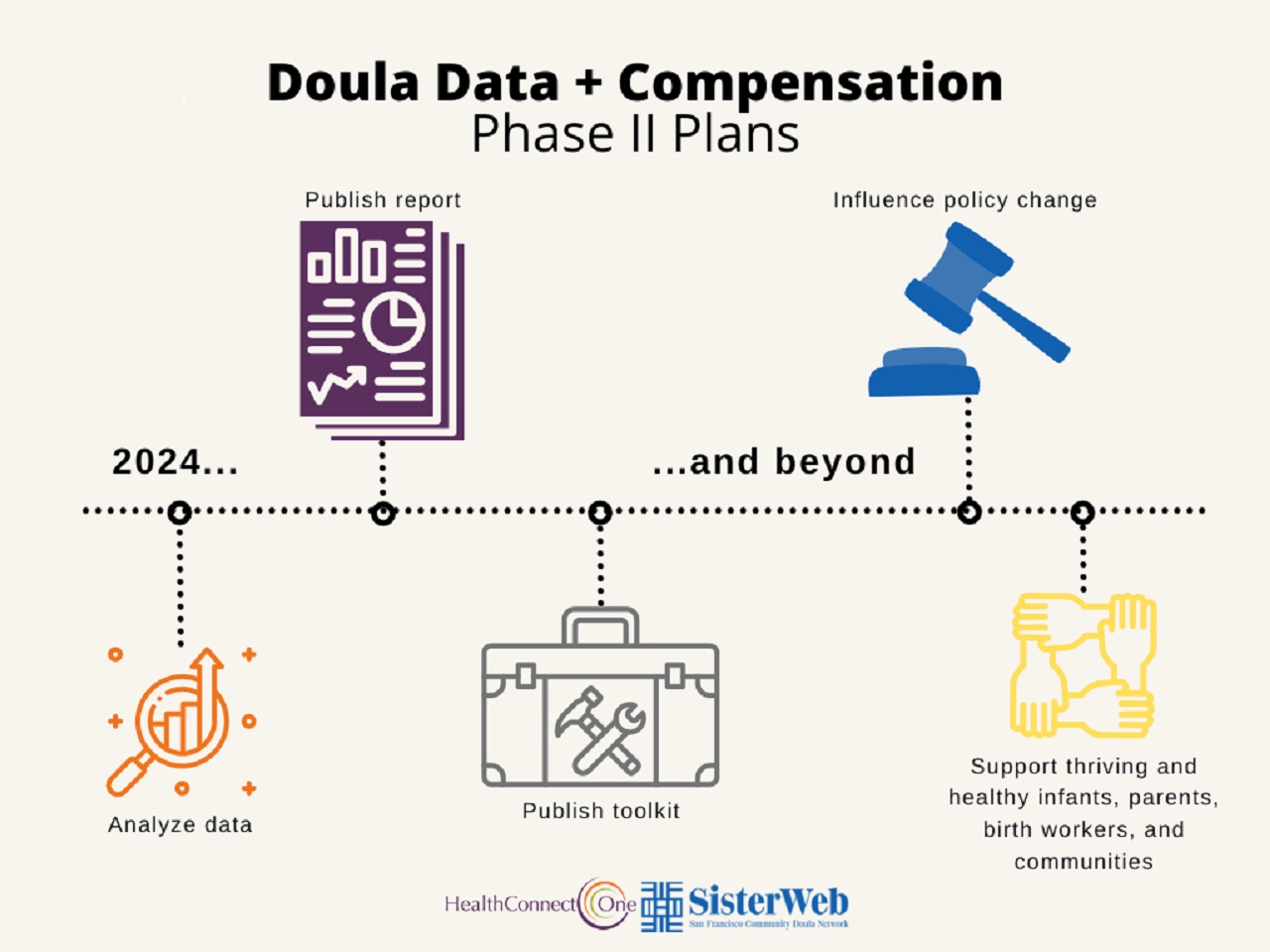 out community-informed policy steps to shape the work of researchers, legislators and funders as they design compensation and Medicaid reimbursement policies that equitably honor doulas’ labor, sustains their work, and advances better outcomes for marginalized and inadequately served birthing families. They will also pass their learnings about working in as a grassroots collective forward, publishing a toolkit highlighting best practices for data collection and interest-holder ownership.
out community-informed policy steps to shape the work of researchers, legislators and funders as they design compensation and Medicaid reimbursement policies that equitably honor doulas’ labor, sustains their work, and advances better outcomes for marginalized and inadequately served birthing families. They will also pass their learnings about working in as a grassroots collective forward, publishing a toolkit highlighting best practices for data collection and interest-holder ownership.
And a New Vision for Birth Work was Born
This project not only centers equity in its aims; it puts equity into practice by centering community birth workers within the web of three key sources of power: money, decision-making, and data.
Funds for Phase I of this project comes from a partnership with the American Family Insurance Institute Healthy Youth Development strategic partnerships team and Every Mother Counts. This money will be dispersed across the key project partners, including directly to the community-based doulas and collectives participating in this work in the form of stipends.
Just as money is directed towards the community workers centered in this research, decision-making power also lies with them and honors the time and work these organizers have put into building trust and solidarity in this work. The consortium of doulas directs the collection and use of their data. While funder relations in the nonprofit sector can often be uneven, distorting decision-making power in favor of the people with money, the AmFam Institute’s model of partnership is based in trusting relationships to support social innovation. They share in learnings and offer in-kind support as needed, but they do not hold decision making power in this project.
Finally, the data collected in this project is made by and for community-based doulas throughout the country, recognizing their diversity of contexts, experiences and needs. To ensure that the data collection process is not simply extractive, the project coordinators are considering community and equity needs when deciding which research institution will ultimately analyze this data and influence private and public conversations that sustain the work of community-based doulas.
The research, data collection, and policy recommendations produced from the Doula Data + Compensation project will be used by HealthConnect One, SisterWeb, and other birthing justice policy advocacy partners to increase community-based doula coordination and compensation throughout the country. If these recommendations are followed, birthing families will have expanded opportunities to access high quality, racially and culturally concordant doula care through all stages of pregnancy, birth, and postpartum. Ultimately, these changes bolster the doulas working within community and will help close equity gaps in birthing outcomes and experiences: healthier infants, well-cared for birthing parents, and more thriving communities.
___
I encourage you to follow along with the progress of this project and of the other incredible work these organizations and their partners are doing by connecting with SisterWeb and HealthConnect One on their social media platforms. We will also share updates on the AmFam Institute social media pages. Next week, I will be back with the final iteration of “Babies, Aunties, Doulas: Our 2022 Birth Justice Year in Review” where I highlight the work of Phoenix’s Cihuapactli Collective.

